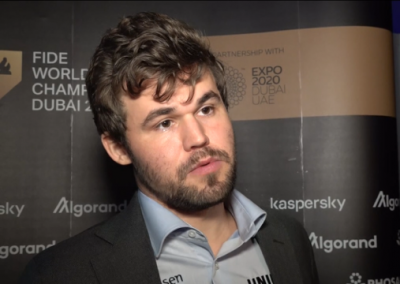Norway may seem an unlikely breeding grounds for an international chess champion like Magnus Carlsen. Most of the world’s great players over the years have come from Russia, the US, China and India, but a childhood in Norway allowed him the freedom to develop his own “inner motivation,” and that may be why he’s so good at his game.

“I’m not so sure my personality would have fit into a Soviet-type regime,” Carlsen, who just won his fifth World Championship title in classic chess, told Oslo newspaper Aftenposten over the weekend. He thinks he’s been “lucky,” and “always driven by inner motivation instead of anyone pushing me.”
Authoritarian countries like Russia, China and the former Eastern European members of the USSR are well-known for “pushing” their athletes, also as children. Pressure is heavy on those in the US as well, and competition brutal. Norway, Carlsen notes, isn’t known for that: “You’re not pushed to anything,” he said. He thinks the conditions he grew up with in Lommedalen, west of Oslo, were highly favourable.
For Carlsen, it was all about playing in the true sense of the world. Chess was fun, and he didn’t really become passionate about playing chess until his family moved back home to Norway after a year in Belgium, where he father Henrik worked for Exxon. Instead of staying for three years as initially expected, the family chose to move home early, when he was seven.
Carlsen told the debating society Oxford Union earlier this year that if the family had stayed in Belgium for another two years, “I probably wouldn’t have begun to play chess.” He was more interested in football then. He was eight when he had his first meeting with a chess club after playing at home with his big sister Ellen and his father. That’s relatively late in life compared to all the top players who began much earlier.

His father Henrik, who’s been at his son’s side all along, told Aftenposten he’s thought a lot over why Magnus became so good, and thinks Norwegian culture played a role. “We never expected such great things for Magnus,” he told newsinenglish.no more than 10 years ago. Now, he told Aftenposten, there were good tournament opportunities in Norway, thanks to lots of Norwegian chess enthusiasts like Arnold Eikrem and Hans Olav Lahlum, the latter also a politician and accomplished author.
The family’s local chess milieu in Oslo, suburban Bærum and Asker was also “very good,” according to Henrik Carlsen, with lots of chess clubs, and then chess pro Simen Agdestein started a chess program at Norges Toppidrettsgymnas, the athletics high school that has propelled lots of other Norwegians to the winners’ platform in their sports.
Magnus’ father also cites the development of online chess, which made access to good chess players much simpler. It all allowed the young Carlsen to evolve as a chess prodigy, and he became a grand master at the age of 13.
“My evaluation is that there’s no reason to believe Magnus had any considerable disadvantages in Norway,” Henrik Carlsen said. “He has become fantastically good. There’s no point in speculating whether he could have become even better.” He began getting some private lessons in chess, and when he was nine, his, his rating shot up by 1,000 points in a year.

“Magnus didn’t grow up with world champions around him” one of his former teachers, Torbjørn Ringdal Hansen, told Aftenposten, “but he didn’t become good despite that. There was a lot that was good for him in Norway, and lots of chess enthusiasts who have devoted their lives to chess.”
For Carlsen, now the world’s undisputed King of Chess after winning the right to reign for at least 10 years as World Champion, it’s still about playing and having fun, even though he’s often photographed frowning and unsmiling. “The motivation is still to enjoy it all, and there’s so much I can be better at,” he said after winning his fifth title over Russian challenger Ian Nepomniachtchi. “I feel like I make mistakes in in all parts of the play, even though there’s naturally a lot that’s good.
“As long as I feel it’s realistic to become much better and understand new things, I won’t lose motivation,” he added. If anything, he thinks there’s too much emphasis on World Champion titles, also the ones he holds in rapid and blitz chess and will soon defend. He claims it wasn’t all-important for him to retain his title, and that shouldn’t be what drives him. It’s just still so much fun to play in tournaments that he has no intention of not doing so, even though he prefers the faster rapid and blitz formats to slower classic chess.
He makes one thing clear: If he ever decides not to play in another World Championship, that won’t mean he’s retiring from the game. “I would like to stress that retiring and not playing in a World Championship are two entirely different things.”
newsinenglish.no/Nina Berglund

